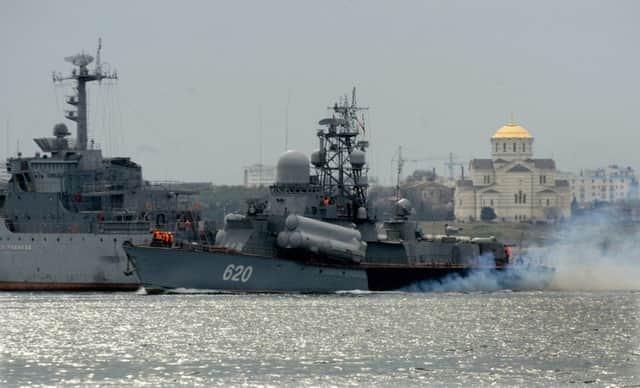Comment: Crimean referendum is an act of desperation


One can forgive the Russian-speaking majority and their political leaders in the autonomous republic for being carried away, and certainly the new regime in Kiev is not blameless for the escalation of the crisis.
Politicians in small ethnic enclaves, such as present Crimea, always pursue policies that are popular in order to maintain their political support. They resort to referendums when two conditions are met: when leaders feel they are under external threat, and they perceive that their political stance has support among the majority of the voters.
Advertisement
Hide AdAdvertisement
Hide AdBoth these conditions are met in Crimea. The key to resolving the situation is to reduce the perceived external threat.
If the leadership in Crimea did not feel that their autonomy was threatened by the new government in Kiev, there would be no reason for calling a referendum. The referendum itself is an act of desperation.
Evidence from earlier so-called “right-sizing” referendums suggests that referendums on ethnic issues are dangerous.
Referendums may appear democratic. But no democracy can function in the long run if it becomes a tyranny of the majority. Similarly to first-past-the-post electoral systems, the winner takes it all in a referendum. As we saw in referendums in Croatia in 1991 and in Bosnia in 1992, referendums held without prior negotiations between the parties exacerbate conflicts and force the losers to embrace political violence. For example, in Bosnia, the Serb minority had no option other than to resort to violence when they were defeated at the polls in a vote they could never win for demographic reasons.
Democracy and majority rule may be good guiding principles in theory; in practice, they only work if there is a modicum of respect for minorities.
The referendum can be a mechanism that consolidates a peaceful settlement. A plebiscite can provide the seal of approval to a negotiated settlement. This was famously the case in Northern Ireland in 1998, when a massive 73 per cent endorsement by voters in the referendum on the Good Friday Agreement facilitated the end of the Troubles. The same was true in Burundi in 2005, where a negotiated settlement between Hutus and Tutsis was endorsed by a referendum.
But the referendum must only be held after a compromise is reached. Anything other than that is likely to result in strife and in many cases, civil war. “War is the continuation of politics by other means”, the German military theorist Carl von Clausewitz famously noted. Nowhere is this truer than in the cases of referendums on ethnic issues.
Granted, all-out war is less likely in Crimea than in Croatia or in Bosnia, but a referendum is unlikely to be conducive to constructive negotiations.
Advertisement
Hide AdAdvertisement
Hide AdInstead of using democratic institutions as weapons in the phony war between Russians and Ukrainians, the two sides should seek a compromise. That is what mature politics is about. Or, as the philosopher John Stuart Mill once put it: “One of the most indispensible requisites in the practical conduct of politics is conciliation: a readiness to compromise, a willingness to concede something to opponents and to shape good measures so as to be as little offensive as possible to persons of opposite views”.
It is only when referendums are held in this spirit of compromise and conciliation that balloting can stop bullets.
When president Barack Obama was presented with the news that a referendum would be held, he responded that it would be “illegal under international law”. The president – although a graduate of Harvard Law School – is not exactly right about the international law bit.
In fact, under international law there are some arguments in favour of the right to hold a referendum. Indeed, the International Court of Justice held in the advisory opinion on Western Sahara that a free vote should be the basis for territorial and sovereignty allocations. But international law is not rock solid and is, in any case, not easy to enforce. What matters is the position in domestic law – the fundamental legal question is what the constitution of the Ukraine says.
In any democratic country that claims to be a Rechtsstaat, it is acknowledged that decisions by public authorities must be based on established laws. This is called the principle of legality. A similar concept exists in Russian and in Ukrainian law, where the notion of pravovoe gosudarstvo – “the rule of law” – has been a fundamental constitutional cornerstone since the fall of Communism.
So, is the proposed referendum on incorporating Crimea into Russia constitutional? The authorities in Crimea may claim that Article 138 provides that “the competence of the Autonomous Republic of Crimea comprises organising and conducting local referendums”. More importantly, the constitution also states – in Article 73 – that “issues of altering the territory of Ukraine are resolved exclusively by an all-Ukrainian referendum”. It is difficult to see how the referendum to be held on 16 March can be compatible with Article 73. The parliament should think again and reverse its decision to hold a vote. A plebiscite might play a role in the future. Once a negotiated settlement is reached, it makes good political sense to have this approved by the people. But before we can get to this position, both sides, not least Kiev, need to show willingness to compromise.
• Matt Qvortrup is author of Referendums and Ethnic Conflict